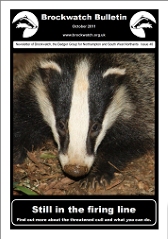
A badger sett in west Northants
Ignorance or lack of knowledge about badgers and laws protecting them can cause unnecessary suffering and death. An example of how this can happen is when someone witnesses suspicious activity at a badger sett but does not know that this should be reported to the police. Another is when someone finds an injured badger but does not know that they can call us (or the RSPCA) to provide help.
Lack of knowledge can also hamper Brockwatch’s efforts to protect badgers. To protect badgers and their setts, we need to know where they are. Some people believe that if they know where a badger sett is located, the best way to protect it is not to tell anybody about it. However, we believe that if you know where a badger sett is located, the best way to protect it is to make sure that it is reported to us, so that we know where it is. There are two main reasons for this:
Threats from developments. New developments – housing and industrial estates, road building, quarries, landfill sites, and the laying of underground utitlies such as water mains and fibre-optic cable networks – are going on all the time. If there are setts in an area where a development is planned, but we do not have those setts on record, we cannot take action to try to protect them. If they are discovered or reported to us after planning permission has been granted, our options are very limited.
Threats from persecution. We may be able to give a measure of protection to setts in areas at risk from persecution – but only if we know where they are located. What’s more, if a sett is not reported to us until after it has been attacked by badger diggers or otherwise disturbed, this can reduce our chances of getting a prosecution, as we will not have records showing that there was an active sett at that location before the persecution took place.

